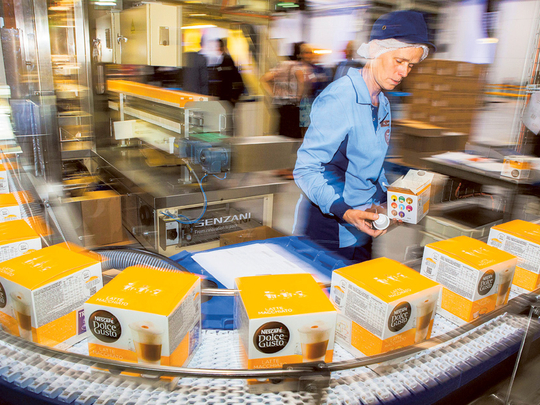
VEVEY, SWITZERLAND: Sales growth at Nestle, the world’s biggest food group, slowed in the first nine months of the year as the company felt the impact of weakness in Asia and pricing pressures in Europe.
The sales figure came in below forecasts and sent Nestle shares lower despite the company sticking to its target for organic sales growth of around 5 per cent this year.
Food groups are facing tough conditions as prices in developed markets decline and growth slows in emerging markets, and Nestle has taken a number of measures that it says have limited the damage.
Sales at the maker of KitKat chocolate bars and Nescafe coffee fell 3.1 per cent to 66.2 billion Swiss francs ($70.3 billion, Dh257 billion)) in the nine months to September, as the strong Swiss franc also took its toll, missing an average estimate of 66.78 billion francs in a Reuters poll.
Trading in Nestle shares, which have gained 2.5 per cent so far this year, was temporarily halted on Thursday morning when they slid more than 4 per cent. They were down 2.4 per cent at 0823 GMT.
Underlying organic growth, adjusted for currency swings, acquisitions and divestitures, was 4.5 per cent in the first nine months of the year, below the forecast 4.7 per cent.
This contrasts with French yogurt maker Danone, which posted a better-than-expected 6.9 per cent underlying rise in third-quarter sales on Wednesday, helped by improving baby food sales in Asia where it is recovering from a health scare last year.
“Growing 4.5 per cent in the today’s environment is solid growth ... it shows we’ve done the right things,” Chief Financial Officer Wan Ling Martello told a media conference at the company’s headquarters in Vevey on lake Geneva on Thursday.
Nestle has taken several measures to deal with underperforming businesses: it is currently in the middle of a portfolio review and has already sold several businesses and announced an overhaul of its regional organisation last month.
It is trying to free up resources to invest into its flagship brands and into new high-margin business opportunities in health science and skin health.
“Organic growth was below forecasts, in particular with regard to the weakening business trend in the third quarter,” J. Safra Sarasin analyst Michael Romer said in a note. He has a Neutral recommendation on the stock.
“Real internal growth in Asia, Oceania and Africa, with weakness in China, seems to have fallen in negative territory in the third quarter, which is a surprise,” he said, adding the group was likely to disappoint on its full-year guidance.











